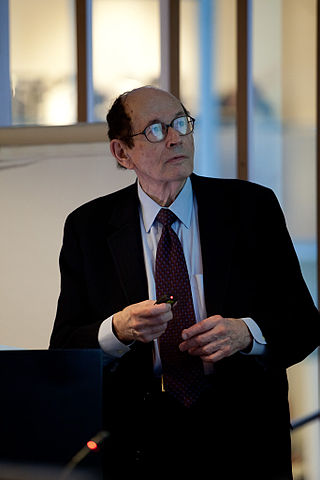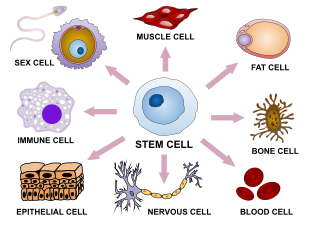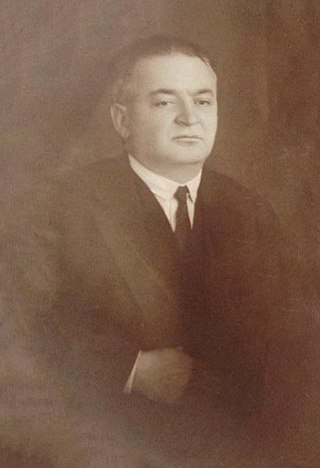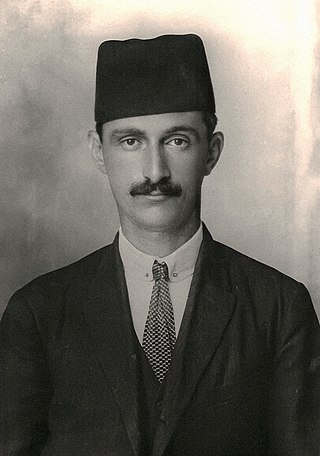Related Research Articles

Neural Darwinism is a biological, and more specifically Darwinian and selectionist, approach to understanding global brain function, originally proposed by American biologist, researcher and Nobel-Prize recipient Gerald Maurice Edelman. Edelman's 1987 book Neural Darwinism introduced the public to the theory of neuronal group selection (TNGS), a theory that attempts to explain global brain function.

Cellular differentiation is the process in which a stem cell changes from one type to a differentiated one. Usually, the cell changes to a more specialized type. Differentiation happens multiple times during the development of a multicellular organism as it changes from a simple zygote to a complex system of tissues and cell types. Differentiation continues in adulthood as adult stem cells divide and create fully differentiated daughter cells during tissue repair and during normal cell turnover. Some differentiation occurs in response to antigen exposure. Differentiation dramatically changes a cell's size, shape, membrane potential, metabolic activity, and responsiveness to signals. These changes are largely due to highly controlled modifications in gene expression and are the study of epigenetics. With a few exceptions, cellular differentiation almost never involves a change in the DNA sequence itself. Metabolic composition, however, gets dramatically altered where stem cells are characterized by abundant metabolites with highly unsaturated structures whose levels decrease upon differentiation. Thus, different cells can have very different physical characteristics despite having the same genome.

Conrad Hal Waddington was a British developmental biologist, paleontologist, geneticist, embryologist and philosopher who laid the foundations for systems biology, epigenetics, and evolutionary developmental biology.
Albanian literature stretches back to the Middle Ages and comprises those literary texts and works written in Albanian. It may also refer to literature written by Albanians in Albania, Kosovo and the Albanian diaspora particularly in Italy. Albanian occupies an independent branch within the Indo-European family and does not have any other closely related language. The origin of Albanian is not entirely known, but it may be a successor of the ancient Illyrian language.

Idhomen Jovan Kosturi, also known as Idhomeno Kosturi, was an Albanian politician, regent and once acting Prime Minister of Albania. He would become the second representative of Albanian Orthodox population to become head of the Albanian government, after Pandeli Evangjeli. Kosturi was also among the contributors to the first Albanian teachers' school, the Shkolla Normale e Elbasanit, a teacher training institution that was founded on 1 December 1909 in Elbasan.

Eqrem Çabej was an Albanian historical linguist and scholar who, through the publication of numerous studies gained a reputation as a key expert in research on Albanian language, literature, ethnology and linguistics.

Bedri Pejani was 20th century Albanian politician. During World War II, he was one of the founders of the Second League of Prizren.
Brian Keith Hall is the George S. Campbell Professor of Biology and University Research Professor Emeritus at Dalhousie University in Halifax, Nova Scotia. Hall has researched and extensively written on bone and cartilage formation in developing vertebrate embryos. He is an active participant in the evolutionary developmental biology (EVO-DEVO) debate on the nature and mechanisms of animal body plan formation. Hall has proposed that the neural crest tissue of vertebrates may be viewed as a fourth embryonic germ layer. As such, the neural crest - in Hall's view - plays a role equivalent to that of the endoderm, mesoderm, and ectoderm of bilaterian development and is a definitive feature of vertebrates. As such, vertebrates are the only quadroblastic, rather than triploblastic bilaterian animals. In vertebrates the neural crest serves to integrate the somatic division and visceral division together via a wide range novel vertebrate tissues.

Ndok Gjeloshi was an Albanian army officer and Militia commander during World War II.

Llazar Siliqi (1924–2001) was a notable Albanian poet. His poetic profile was influenced by the work of Mayakovsky.

Andrea Shundi was an Albanian-American agronomist. His academic research and publications focused mainly on the forage systems as a source feeding of the livestock, on viticulture and viniculture, and also on the history of the Albanian agriculture.
The evolution of nervous systems dates back to the first development of nervous systems in animals. Neurons developed as specialized electrical signaling cells in multicellular animals, adapting the mechanism of action potentials present in motile single-celled and colonial eukaryotes. Primitive systems, like those found in protists, use chemical signalling for movement and sensitivity; data suggests these were precursors to modern neural cell types and their synapses. When some animals started living a mobile lifestyle and eating larger food particles externally, they developed ciliated epithelia, contractile muscles and coordinating & sensitive neurons for it in their outer layer.

Metropolitan Visarion Xhuvani was the primate of the Orthodox Autocephalous Church of Albania from 1929 to 1936. He was a main contributor to the autocephaly, and a close collaborator of Fan Noli.

Skënder Petro Luarasi was an Albanian scholar, writer and anti-fascist activist.

Xhemal Bushati (1880–1941) was an Albanian politician of the twentieth century.

Studime Filologjike is a scientific magazine on Albanian language and literature, published by the Centre of Albanological Studies. It publishes linguistics studies, literary historical studies, old texts, resumes of scientific work on literature criticism and linguistics, etc.
Riza Dani (1887–1949) was an Albanian politician and activist of the 20th century.
Skifter Këlliçi, is an Albanian fiction writer, screenwriter, sports journalist, and radio & TV personality. He started the first radio program that broadcast live sports events in 1958 on Radio Televizioni Shqiptar, the Rubrika Sportive, a show that continues to this day, and later did the same on the Albanian television. He has been a successful screenwriter with movies such as Pas gjurmëve, winner of the international Giffoni Film Festival, Italy, in 1979.
Stefan Shundi (1906–1947) was an Albanian writer, literary critic, journalist, lawyer, football player, and sports director. During 1933 to 1936 he was president of the KF Tirana football association.

Zojz is a sky and lightning god in Albanian pagan mythology. Regarded as the chief god and the highest of all gods, traces of his worship survived in northern Albania until the early 20th century, and in some forms still continue today. The old beliefs in the Sky are pagan beliefs preserved by Albanians since ancient times. In Albanian the god who rules the sky is referred to as i Bukuri i Qiellit, a phrase that is used in pagan contexts for the Sun (Dielli), worshiped as the god of light, sky and weather, giver of life, health and energy, and all-seeing eye. The sacred significance of one of the main symbols of the sky cult – the eagle – has been scrupulously preserved by Albanians, who have always considered it their animal totem. An epithet considered to be associated with the sky-god is "father", thought to be contained in the Albanian noun Zot, used to refer to the supreme entity. A remarkable reflection of Proto-Indo-European mythology associated with the dawn goddess *H₂éwsōs is the Albanian tradition according to which the dawn goddess – Prende – is the daughter of the sky god – Zojz.
References
- ↑ Jablonka, Eva (June 2009). "Book review: The nervous system in development and evolution". BioEssays. 31 (6): 687–689. doi:10.1002/bies.200900039.
Cabej is right in arguing that the evolution of the nervous system significantly altered and accelerated metazoan evolution covers a very wide area and provides a host of useful examples arguing convincingly that the nervous system has a central role in animal evolution
- ↑ Gabora, Liane (June 2009). "New Biological Books. Evolution. Epigenetic Principles of Evolution: With Emphasis on Developmental Mechanisms of Evolutionary Change in Metazoans". The Quarterly Review of Biology. 84 (2): 193. doi:10.1086/603475.